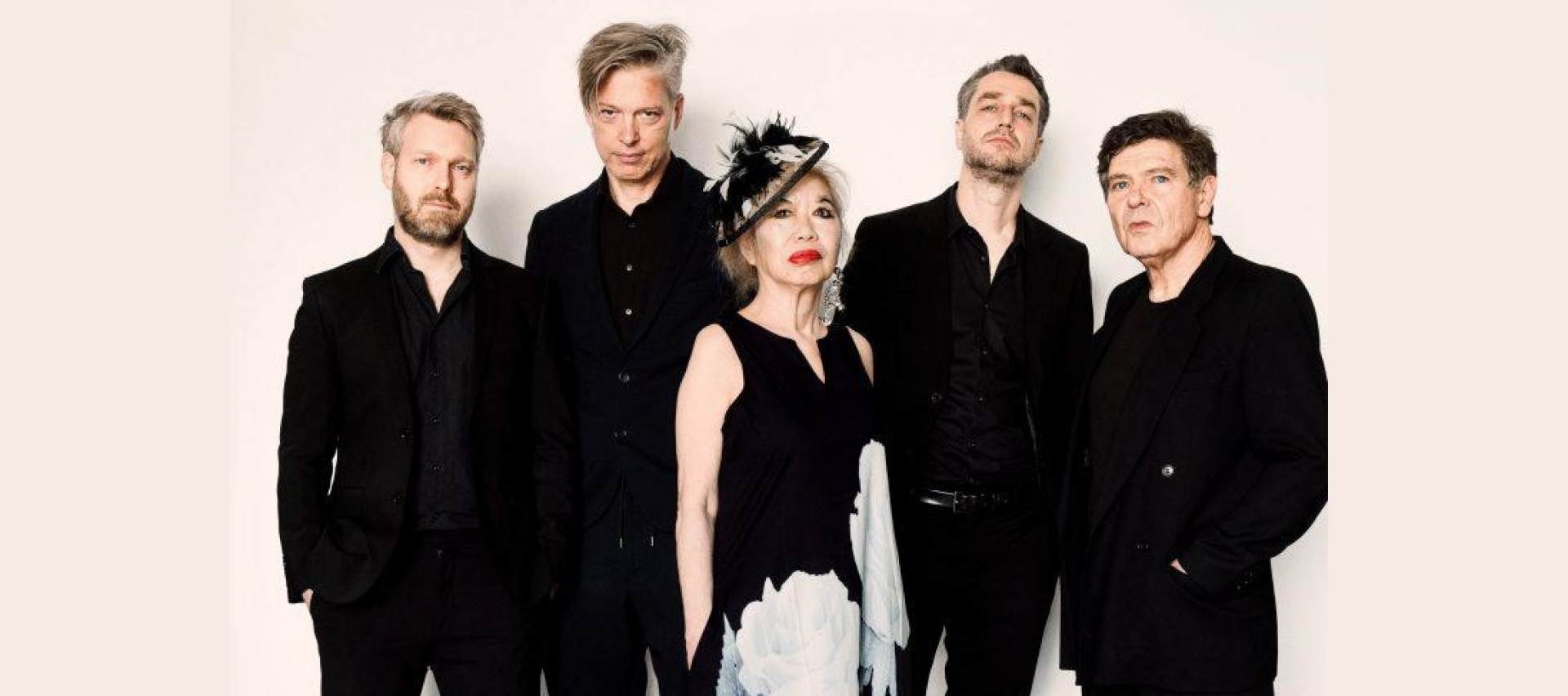Aki Takase Japanic
May 2024 | ||||||
|---|---|---|---|---|---|---|
Mo | Tu | We | Th | Fr | Sa | Su |
Aki Takase's band may be called Japanese, but "Thema Prima" belongs to no continent, no generation, no genre. The best title you can give it is – music! (Wolf Kampmann)
The quirks of the Japanese sometimes seem very surprising to Europeans. Vice versa it will probably behave in the same way. What have the Japanese been delighting the old world with since the 1970s: Sony and Pioneer, Yamaha and Yanagisawa, Honda and Mitsubishi, sushi and maki, manga and anime and, most importantly for this content, a wealth of famous jazz musicians. One of them is the extraordinary pianist Aki Takase. From Tokyo via New York she came to Europe and landed in Berlin, married the “global improviser” and “large format artist” Alexander von Schlippenbach, and since then has been a constantly surprising, convincing constant in the advanced European jazz landscape. Countless collaborations with the most well-known proponents on both sides of the Atlantic speak for themselves. She calls her current project Japanese, to which she invited musicians a generation younger from Berlin's extensive creative pool. Is “Japanic” a synonym for the East West clasp?, form of a cultural aesthetic? or just a clever play on words? Maybe a little of everything. For Takase's music, it is said to be a contradiction to the conformity to the rules practiced by most Japanese people. Takase thinks and feels pluralistically. Takase absorbs the interest in the music of European modernism at the beginning of the 20th century as well as many jazz revolutionaries of all eras in her non-conformist and daring keyboard art. What stands out here is the balance between being outside yourself and concentrating. Negotiates with a stupendous playing technique and touch culture, an expanded sound horizon that allows you to have extensive control over the entire keyboard. Major octave and contra-octave are obligatory areas of her playing. Likewise, the pianist's pronounced left hand is concerned with melodic developments, single-note series. This equality between the hands allowed the Fazioli grand piano to sound with particular spatial opulence. Which not too many pianists manage to do. Intensity, which Takase exploits with incredible care and focus, is another element of urgency in the music. The opener already excellently reflected the original band sound, the multidirectional content of the Japanese quintet's inscribed jazz progressiveness. A duet between Takase and Vincent v. Schlippenbach. A massively gnarly ostinato burst out of the keys, which DJ Illvibe (Schlippenbach Jr's pseudonym) enriched with a scratched, agile rhythm figure. He was a discovery when it came to turntable-ism. Schlippenbach has created an independent instrument from his equipment and does not use his tonal ready-mades as noise additions but rather uses them to develop musical structures. Percussive character, mostly. Packed in concrete grooves or detached pulsations. The drumming artistry of Paul Lovens serves as a basis, the electronic middle section of the Pink Floyd piece Echoes, vibraphone sequences. But a bel canto soprano also mutates into an integral part of a piece. This is turntable-ism of a new quality. The best “record player” in contemporary European music played here.
Intuition is a crucial premise in the entire ensemble. And this is not curtailed by Takase's excitingly intricate compositions, which form the lioness part. Abstract textures give way to tempered content; exude as successful osmosis. This dynamic of constantly moving forces impresses with its spontaneity, counterpoint finesse and alterations. In the calculated sub-areas as well as in the ad hoc imaginations. With regard to the latter, the performers turned to the liberated philosophy of sound games as well as conventional forms with the greatest musical and technical competence. In addition to the two mentioned above, Erdmann as a smoothly raving saxophonist with a penetrating tone, drummer Narvesen as an imaginative rhythm kinematicist and the bassist with the bass stringed cello Johannes Fink with his smooth playing, consolidating the rhythmic consistency. Close interaction and a compact band sound are the advantages of a formation bursting with creative urge. Stringency, curiosity, contemporaryness, yes, to such heartwarming “scaremongering”. (Hannes Schweiger about the concert on December 18, 2021)
Program and cast
Aki Takase: piano
Daniel Erdmann: tenor saxophone
DJ Illvibe aka Vincent von Schlippenbach: turntable
Carlos Bica: bass
Dag Magnus Narvesen: drums
PORGY & BESS Jazzclub
Porgy & Bess (actually, Jazz and Music Club Porgy & Bess ) is a jazz club in the Riemergasse 11 in the 1st district of Vienna. The club , founded in 1993 is considered " the most important jazz organizer and trendy meeting point " of the Austrian capital .
The program of Porgy & Bess speaks to a very large audience , about 70,000 guests a year ; is accordingly Jazz " understood very pluralistic ," and the program " even in fringe areas , such as electronic music , contemporary music and world music penetrated . " Many international artists , particularly from the U.S. space , see also Austrian musician here an opportunity to perform . The club also offers the stage for events, such as the award of the Austrian World Music Award.
Musicologist Christian Scheib According to the Porgy & Bess " at the same time essential for the development of the musical ( jazz ) reality of a City" and needs and uses ' plain commonplace as urban space music. " It creates itself " through artistic preferences, acoustic quality , capacity and real capacity, the necessary exclusion of other clubs. " Here, the different areas of the jazz clubs allow - the area in front of the stage with tables, upstairs gallery , a lateral area with a bar at counter - different intense concentration on the concert scene . For Jazzthetik Porgy & Bess is even a " traditional club . "

 EN
EN DE
DE IT
IT FR
FR ES
ES RU
RU JP
JP RO
RO